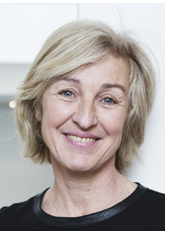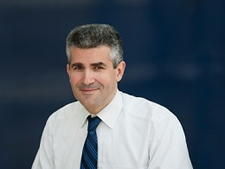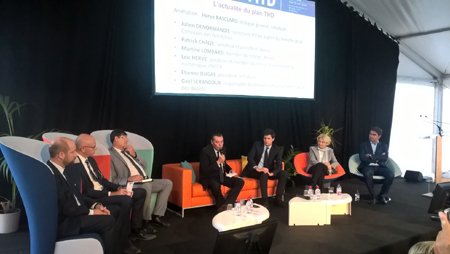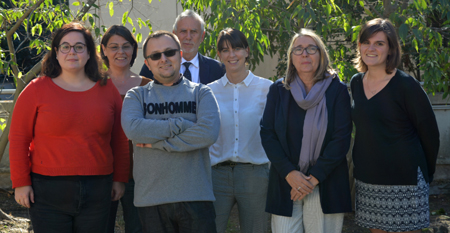 |  Europe’s new General Data Protection Regulation (GDPR) has been in effect for scarcely four months, but its ripple effects are already being felt.
Europe’s new General Data Protection Regulation (GDPR) has been in effect for scarcely four months, but its ripple effects are already being felt.
For businesses, this means adapting more fully to this new data-centric culture in which protecting people’s privacy and innovation need to go in hand in hand to build an environment of trust. Clearly a massive effort to be made, especially by SMEs, but I’m convinced that it is a winning move for Europe which has chosen here the path of ethical and sustainable growth.
The ripple effects also include the normative influence that Europe is having on this issue. California recently adopted a law that draws its inspiration from the European model. Japan signed an adequacy agreement with Europe during the summer to facilitate data transfers, and Argentina is working on a similar law.
A ripple effect too for the people who have embraced these new rights and are counting on regulatory authorities to enforce them. In France, data protection authority CNIL saw a 56% jump in customer complaints in four months.
CNIL needs to be able to support and channel the mighty impact of the GDPR, keeping pace with the power of digital technology and the expectations it fosters. This is a considerable challenge for our institution, set at the crossroads of potentially sizeable economic and strategic conflicts.
And a challenge that is not ours alone but a collective one, as it is vital that European authorities cooperate on all cross-border issues.
Diplomacy, regulation and pragmatism will need to work as one to ensure the GDPR can keep its promises.
Isabelle FALQUE-PIERROTIN, Chair of CNIL

|  |
 |
Regulation in action
Post-summer update | What’s new in the mobile market?
New Deal for Mobile: the frequency reallocation procedure has begun!
As part of the New Deal for Mobile that was concluded in January, acting on a proposal from Arcep, the Government issued calls to tender with a view to reallocating 900 MHz, 1800 MHz and 2.1 GHz band frequencies that are currently being used for 2G, 3G and 4G. Last week, Arcep published the answers it gave to the questions received from potential candidates
In accordance with the New Deal for Mobile, these new licences will contain unprecedented obligations: with the help of a “mobile window”, to increase the pace of targeted programmes for improving coverage, with each operator being required to deploy 5,000 new 4G cell sites, some of which will be shared, in areas identified by the Minister responsible for electronic communications; to improve reception quality nationwide, especially in rural areas; to make all current 2G and 3G cell sites 4G-capable; to accelerate 4G coverage along the country’s 55,000 km of roadways...
It is worth noting that operators’ commitments for 2018 – 2021 are already enforceable and legally binding. This frequency reallocation will extend operators’ obligations up to 2030.
Evaluating regional connectivity: Arcep publishes its measurement protocols
Arcep has released the protocols it employs to measure mobile service quality and coverage, providing common standards for assessing regional connectivity.
|  |
 |
|
On our radar
| |
Bruno Sportisse, CEO of Inria
Researcher and entrepreneur, founder of the artificial intelligence start-up, Skopai, Bruno Sportisse took over as head of Inria on 27 June.
The French National Institute for computer science and applied mathematics (Inria) has a staff of close to 2,400 people (researchers, engineers…) and is responsible for a host of innovations, working to advance research in multiple domains (artificial intelligence, privacy protection…). Inria has a long tradition of sharing its work with businesses, start-ups, SMEs and large corporations. The institute also lends its skills and expertise to areas such as health, security and factories of the future.
| 
|
|
| |  | |
News from around the world
Circumventing app stores: the Fortnite example
Fortnite is one of today’s most popular mobile games. According to Sensor Tower Store Intelligence, it was generating up to 2 million dollars a day after its iPhone version launched this past spring. Apple will earn close to a third of that amount ($600,000) via the iStore, according to the company’s revenue sharing rules. Which are similar to the rules that govern Google’s Play Store...
Taking advantage of the fact that Google allows users to download apps from locations other than its app store, publisher EPIC Games elected to distribute its game directly from its site. Which saves it from having to pay over a portion of its earnings to Google (the app is still not available on the Play Store). Despite it being more complicated to install the game, and a security bug in the early days (which was fixed within 24 hours), the game was download 15 million times onto Android smartphones in less than 21 days.
Is this the shape of things to come? Already back in 2016, Spotify blocked users’ ability to subscribe using an app (despite it still being available on app stores), also as a way to get around these revenue sharing rules. And Netflix is currently testing a similar strategy.
Attempts to circumvent app stores is one of the issues that Arcep raises in its report “Devices: the weak link in achieving an open internet” that was published in February. The report contains several proposals designed to help lift, more directly, some of the restrictions imposed by the device market’s key stakeholders.
|
| |
 |

L'Arcep likes
General Assembly on new Digital regulations
Members of Parliament, regulators, State representatives and members of the French Digital Council (CNNum) have been working together since June as part of the General Assembly on new digital regulations, launched by France’s Secretary of State for Digital Affairs, Mounir Mahjoubi.
The conclusions are as follows: digital technology is nearing maturity. It has thus become necessary to anticipate and design an adapted and adaptable framework for the coming decade, and to ensure overall consistency by putting an end to initiatives that are too piecemeal or have come too late, in response to specific criticisms or events.
Actions are being taken in four areas:
- economic (taxation, net neutrality, fairness of platforms, updating competition laws…);
- social (social protection of workers in the sharing economy era, streamlining procedures…);
- societal (information handling, battling screen addiction…);
- regulatory methods (regulators’ new legal and technical tools to implement, data-driven regulation…).
Arcep is contributing to the work being done on economic and regulatory aspects.
At the same time, CNNum recently launched an online forum and has invited all interested institutions, associations and business to take part in the dialogue.
The review of the current state of digital regulation is due to be complete in early 2019. The main purpose of this work is to continue and expand Europe’s Digital Agenda.
“Let’s design a “Robin Hood” regulation, that takes power from the digital giants and gives it to all!” - Interview with Sébastien Soriano, Arcep Chair – Concurrences (in French)
“GAFA quartet: we need to storm the digital Bastille” – Interview with Sébastien Soriano – Alternatives Économiques (in French)
|  | | | | |
|
 |
Field notes
Arcep Executive Board member, Martine Lombard, participated in the Summer University on superfast access, hosted by InfraNum (ex-FIRIP) in Laval, on 20 September. The event brought together local and national elected officials, public-initiative network project owners, telcos and equipment suppliers, and included conferences and demonstration stands. Martine Lombard was on stage with Julien Denormandie, Secretary of State for Territorial Cohesion, Patrick Chaize, Senator and President of Avicca, Loïc Hervé, Senator and spokesperson for FNCCR, Etienne Dugas, President of InfraNum and Gaël Sérandour of the Caisse des dépôts.
The discussions provided a chance to take stock of the issues of the day: the bill on housing development, regional planning and digital affairs (ELAN), job creation and training, digital inclusion… and so gave Martine Lombard an opportunity to discuss the implementation of regulation for the business market, and the market analyses adopted in late 2017. The aim of these decisions: to develop a mass market for fibre for micro, small and medium businesses, and assist them in their digital transition.
 |  |
 |
Arcep, telling it like it is
 Arcep’s 360° remodel moves to the Web! Arcep’s 360° remodel moves to the Web!
On 6 September, Arcep launched its new website, which was designed and developed in tandem with agencies, Spintank and Gaya. Our aim was to provide rapid proof that the new directions Arcep is taking include its web presence. Mission accomplished. We hope to have laid down a solid foundation: a site with a responsive design on both computers and mobiles, easier and more intuitive browsing, an IPv6 site to lead by example, equipped with a search engine, more accessible to audiences that are not necessarily familiar with Arcep (members of the public, start-ups, SMEs)…
The tremendous involvement of the entire Communications and Partnerships Department helped achieve painstaking work that will continue to pay dividends. Launch day felt like being a child on Christmas morning, giddily opening up your present… despite knowing that dozens of tests still need to be run, URLs rerouted, 404 errors tracked, etc.
Work on the new site has only just begun. All of the content from the old site (which will remain accessible at archive.arcep.fr until the end of 2018) still needs to be migrated to its new home.
Clémentine Beaumont, Jean-François Hernandez, Ingrid Appenzeller, Anne-Lise Lucas, Jean-Baptiste Sangla, Pascale Thabeau, Charlotte Victoria
Directorate for Communications et partnerships
|  |
 |
Mark your calendar

10 October 2018 in Paris | IP♥6 Workshop
As part of the Internet Governance Forum, Arcep is hosting a workshop in partnership with Internet Society France, devoted to sharing experiences and best practices for making the transition from IPv4 to IPv6. Several working groups will discuss teaching IPv6, the Government’s exemplary stance on the matter, and preparing for the phasing out of IPv4.
Registration
|  |
 |
27 September in Paris
Telco and Digital Forum 2018
Les Echos is inviting telecoms sector stakeholders to come together to take stock of the latest market news and top French and European players’ strategies. Superfast fixed and mobile network rollouts, 5G and content… will be the key areas of focus of the morning’s debates. Arcep’s Director-General, Cécile Dubarry, will be on hand to talk about the national plan and Arcep’s work programme for 5G.
Arcep’s work programme
For more information
3 October in Portoroz (Slovenia)
BEREC plenary meeting
The Body of European Regulators for Electronic Communications (BEREC) will be gathering in Slovenia on 3 October for its 36th plenary meeting. BEREC’s work programme for 2019 will be presented and approved for public consultation. The plenary meeting is not open to the public, but its conclusions will be presented at a press conference the following week.
Find out more
4 October in Paris
Submission of the report from the fact-finding mission for new audiovisual regulation for the digital era
A day of discussion and debate will be held at the National Assembly to coincide with the submission of the report from the fact-finding mission on crafting new audiovisual regulation for the digital era, for which Sébastien Soriano was interviewed. Three roundtables will be held. Arcep Board member, Monique Liebert-Champagne will speak on the topic of “Which regulator(s) for which regulation?”
11 October in Paris
NPA-Le Figaro symposium on the media economy
Arcep Chair, Sébastien Soriano, will be speaking at the NPA-Le Figaro symposium on 11 October whose core theme will be: “2019: innovations, clashes and explosions”.
Find out more
16 October in Paris
ANFr Conference: “Spectrum at the heart of three revolutions: 5G, space, mobility”
The fifth edition of the “Spectrum & Innovation” conference hosted by France’s national frequency agency, ANFr, will be held on 16 October at Station F. It will be an opportunity to discuss the core issues surrounding frequency management in an increasingly connected world. Sébastien Soriano will be on hand to talk about the actions that Arcep is taking on 5G.
Find out more
18 and 19 October in Morteau
ANEM meeting
France’s national association for elected officials from mountain regions (ANEM) will be hosting its annual meeting on 18 and 19 October. It will include a round table devoted superfast fixed and mobile network deployments in mountainous regions. With the participation of Sébastien Soriano.
Find out more
| |

 |
|  |
|

